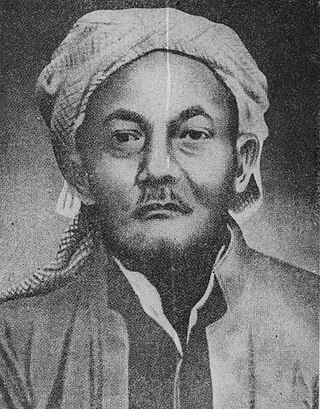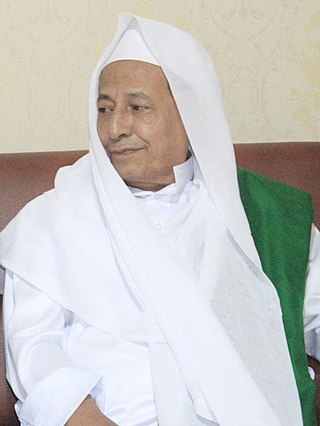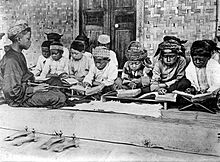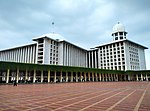
The National Awakening Party, frequently abbreviated to PKB, is an Islam-based political party in Indonesia.

Nahdlatul Ulama is an Islamic organization in Indonesia. Its membership numbered over 95 million in 2021, making it the largest Islamic organization in the world. NU is also a charitable body funding schools and hospitals as well as organizing communities to help alleviate poverty.

Islam is the largest religion in Indonesia, with 87% of the Indonesian population identifying themselves as Muslims, based on civil registry data in 2022. In terms of denomination, the overwhelming majority are Sunni Muslims; the Pew Research Center estimates them as comprising ~99% of the country's Muslim population in 2011, with the remaining 1% being Shia who are concentrated around Jakarta and about 400,000 Ahmadi as well. Indonesia is the most populous Muslim-majority country.

Muhammadiyah ; officially Muhammadiyah Society is a major Islamic non-governmental organization in Indonesia. The organization was founded in 1912 by Ahmad Dahlan in the city of Yogyakarta as a reformist socioreligious movement, advocating ijtihad - individual interpretation of Qur'an and Sunnah, as opposed to Taqlid - conformity to the traditional interpretations propounded by the ulama. Since its establishment, Muhammadiyah has adopted a reformist platform mixing religious and secular education, primarily as a way to promote the upward mobility of Muslims toward a 'modern' community and to purify Indonesian Islam of local syncretic practices. It continues to support local culture and promote religious tolerance in Indonesia, while a few of its higher education institutions are attended mostly by non-Muslims, especially in East Nusa Tenggara and Papua provinces. The group also runs a large chain of charity hospitals, and operated 128 universities as of the late 1990s.

Kyai Haji Ahmad Dahlan, often abbreviated to K.H. Ahmad Dahlan, was an Indonesian Muslim religious leader and revivalist, who established the Muhammadiyah organization. Which would become one of the largest Muslim organizations in Indonesia, second only to the Nahdlatul Ulama. Born in Kauman, Yogyakarta, he was the son of an imam of a local mosque and traced his origins from the lineage of Muhammad. Ahmad Dahlan performed the Hajj pilgrimage when he was 15 years old, and he lived in Mecca for another five years.

The Council of Indonesian Muslim Associations Party, better known as the Masyumi Party, was a major Islamic political party in Indonesia during the Liberal Democracy Era in Indonesia. It was banned in 1960 by President Sukarno for supporting the PRRI rebellion.

Kyai Haji Hasyim Asy'ari was an Indonesian ulama, National Hero and founder of Nahdlatul Ulama.
Zuhairi Misrawi is an Indonesian writer. Misrawi first gained public notice as a young intellectual at Nahdlatul Ulama (NU), and a traditionalist member of the Sunni Islam group in Indonesia. Misrawi completed his undergraduate education with the Creed-Philosophy Department, Faculty of Usul al-Din, Al-Azhar University, Cairo, Egypt (1995–2000). Returning from Cairo, Misrawi was an active participant in the Institute for Study and Human Resource of Nahdlatul Ulama and was the Coordinator of Study and Research in 2000–2002. Misrawi is close to the world of contemporary Islamic thought and has served as director of the "Moderate Muslim Society".

Kebumen is a town on the island of Java, Indonesia and is the administrative centre of Kebumen Regency, in Central Java Province. It is also the name of the main town of the district of Kebumen. The population of the town at the 2010 Census was 118,847, while the 2020 Census gave a total of 131,750; the official estimate as at mid 2022 was 133,030. Kebumen has other names - "Swallow City", "City Tours", and "the city of culture".
February 2017 Jakarta protests refer to a series of mass protest led by Islamist movements which took place on 11 February 2017 and 21 February 2017 in Jakarta, Indonesia, and dubbed as the Action 112 and the Action 212 respectively. The protests were aimed against the incumbent governor of Jakarta Special Capital Region Basuki Tjahaja Purnama for an alleged blasphemy of the Quran, the Islamic holy book.

Maulana Al-Habib Muhammad Luthfi bin Ali bin Yahya, colloquially known as Habib Luthfi, is an Arab Indonesian Islamic sheikh, kyai and preacher from Pekalongan, Central Java, who has served as a member of the Indonesian Presidential Advisory Council since December 2019.

Ansor Youth Movement is a non-profit Islamic youth organization based in Indonesia, affiliated with Nahdlatul Ulama (NU), the largest Islamic mass organization in the world. Founded on April 24, 1934, GP Ansor has maintained a significant role throughout the history of Indonesia, and it has developed its characteristics as traditionalist Islamic, populist, and nationalist. It has grown so far into 433 branches on the municipal and regent level, under the coordination by 32 district managers from provincial down to the village level. This is also coupled with the management of the multipurpose paramilitary wing Banser, which requires the special membership to join.

Islam is the most common religion in the Indonesian province of West Sumatra, embraced by 97.42% of the population. The Muslim population increases to 99.6% if it excludes the Mentawai Islands, where the majority of the non-Muslim (Protestant) West Sumatrans reside. Islam in West Sumatra is predominantly Sunni, though there is a small Shia Islamic pocket within the coastal city of Pariaman. The Minangkabau people, indigenous to West Sumatra, comprise 88% of the West Sumatran population today and have historically played an important role within Indonesia's Muslim community. Up until today, the region is considered one of the strongholds of Islam in Indonesia.

Islam is the most common religion in the Indonesian province of East Java, embraced by 96.7% of the whole population. Throughout its history, East Java has been considered one of the heartlands of Islam in Indonesia; the province experienced one of the earliest proliferations of Islam, as well as the establishment of the largest Islamic mass organization in Indonesia, Nahdlatul Ulama.
In the context of Muslim society in Indonesia, Traditionalism or traditionalist Islam refers to a religious strand which puts emphasis on preserving traditionally established local rituals and scholarship. Traditionalist Muslims refer to themselves as ahlussunnah wal-jamā'ah or aswaja. Traditionalism is often contrasted with modernism, which is inspired by modernity and rationalism. Traditionalism has been the most adhered Muslim religious orientation in the history of contemporary Muslim Indonesia. The extent of traditionalism widely overlaps with the influence of a socio-religious organization Nahdlatul Ulama, the biggest Muslim organization in Indonesia. Traditionalism is also a critical element within the Muslim intellectual movement known as Islam Nusantara.
In the context of Muslim society in Indonesia, Modernism or modernist Islam refers to a religious movement which puts emphasis on teachings purely derived from the Islamic religious scriptures, the Qur'an and Hadith. Modernism is often contrasted with traditionalism, which upholds ulama-based and syncretic vernacular traditions. Modernism is inspired by reformism during the late-19th to early 20th century based in the Middle East, such as the Islamic modernist, Salafiyya and Wahhabi movements. Throughout the history of contemporary Muslim Indonesia, these movements have inspired various religious organizations; from the mass organization Muhammadiyah (1912), political party Masyumi Party (1943), to missionary organization Indonesian Islamic Dawah Council (1967).
In July 2005, Indonesian Ulema Council (MUI), a semi-official Islamic clerical body of Indonesia, issued a fatwa, or an Islamic legal opinion, against religious pluralism, liberalism, and secularism. The issuance of fatwa garnered substantial controversy and scholarly attention. The fatwa addressed the reformist trend of Islam which had been popular among the broad Indonesian society over the past 25 years. Such trends advocated for a more substantive reading of the Quran and Hadith, instead of literalist approaches taken by the majority of ulamas. MUI considered such ideas as incompatible with Islamic teaching, releasing the fatwa to promote a more literal reading of the Islamic scriptures. The fatwa was heavily criticized by progressive Muslim intellectuals.

Kyai Hajj Abdul Wahab Hasbullah was a founders of the Nahdlatul Ulama movement. He also initiated the usage of newspaper for dakwah, with the establishment of the Nahdlatul Ulama newspaper, Soeara Nahdlatul Oelama. He also created the lyrics for the anthem of Nahdlatul Ulama, Ya Lal Wathon, in 1934.

Abuya Kyai Hajji Ahmad Muhtadi bin Dimyathi al-Bantani or better known as Abuya Muhtadi is an Indonesian Muslim cleric from Banten. He is known as one of the Muslim scholars close to President Joko Widodo. At the Zikir Kebangsaan which was first held by the Indonesian government in the Merdeka Palace in 2017, Muhtadi was one of the religious leaders invited by the president. In the 2019 Indonesian presidential election, he supported a friend who was also a Muslim cleric from Banten, Ma'ruf Amin, who became the running mate of incumbent presidential candidate, Joko Widodo. Even so, in the 2014 Indonesian presidential election, he supported Prabowo Subianto as a candidate for Indonesian President and instructed his students to vote for Subianto.

Kyai Hajji Zubair Dahlan was an Indonesian ulama of tafsir, fiqh, uṣūl al-fiqh, and tasawwuf from Rembang Regency, Central Java. Every year, in the month of Ramadan, Zubair always routinely teaches the Tafsir al-Jalalayn to his students. In addition, he also active in teaching branches of Arabic grammar and tawhid at the Pesantren Sarang. Zubair is the father of an influential cleric in Indonesia, Maimun Zubair, and a teacher of several Nahdlatul Ulama cleric such as Sahal Mahfudz, Bisri Syansuri, and others. Some of his students later became caregivers and leaders of famous pesantren in Indonesia, such as Pondok Pesantren Lirboyo, Pondok Pesantren Sidogiri, Pondok Pesantren Al-Falah Ploso, Pondok Pesantren Mranggen, and other pesantren.


















